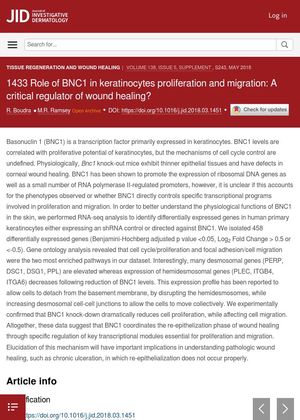Role of BNC1 in Keratinocytes Proliferation and Migration: A Critical Regulator of Wound Healing?
April 2018
in “
Journal of Investigative Dermatology
”
Basonuclin 1 BNC1 keratinocytes cell proliferation cell migration epithelial tissues corneal wound healing differentially expressed genes cell cycle focal adhesion desmosomal genes hemidesmosomal genes basement membrane re-epithelization wound healing chronic ulceration skin cells wound repair chronic wounds

TLDR Basonuclin 1 (BNC1) helps skin cells multiply and move, which is crucial for wound healing.
The 2018 study investigated the role of Basonuclin 1 (BNC1), a transcription factor primarily expressed in keratinocytes, in cell proliferation and migration. The researchers found that BNC1 levels are correlated with the proliferative potential of keratinocytes. In Bnc1 knock-out mice, thinner epithelial tissues and defects in corneal wound healing were observed. The study identified 458 differentially expressed genes in human primary keratinocytes with reduced BNC1 levels, with cell cycle/proliferation and focal adhesion/cell migration being the most enriched pathways. The reduction of BNC1 levels led to an increase in desmosomal genes and a decrease in hemidesmosomal genes, a profile that allows cells to detach from the basement membrane and move collectively. The study concluded that BNC1 coordinates the re-epithelization phase of wound healing through specific regulation of key transcriptional modules essential for proliferation and migration. This understanding could have significant implications for understanding pathologic wound healing, such as chronic ulceration.